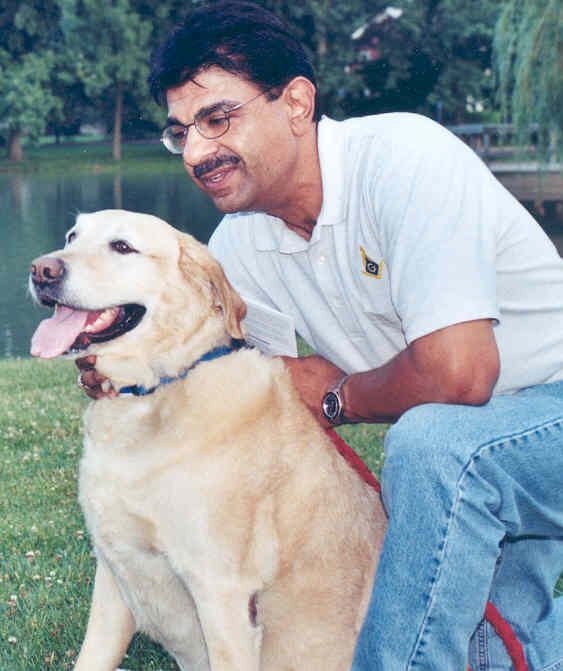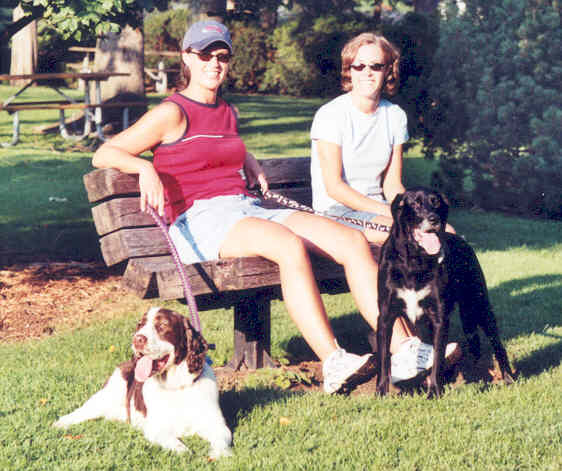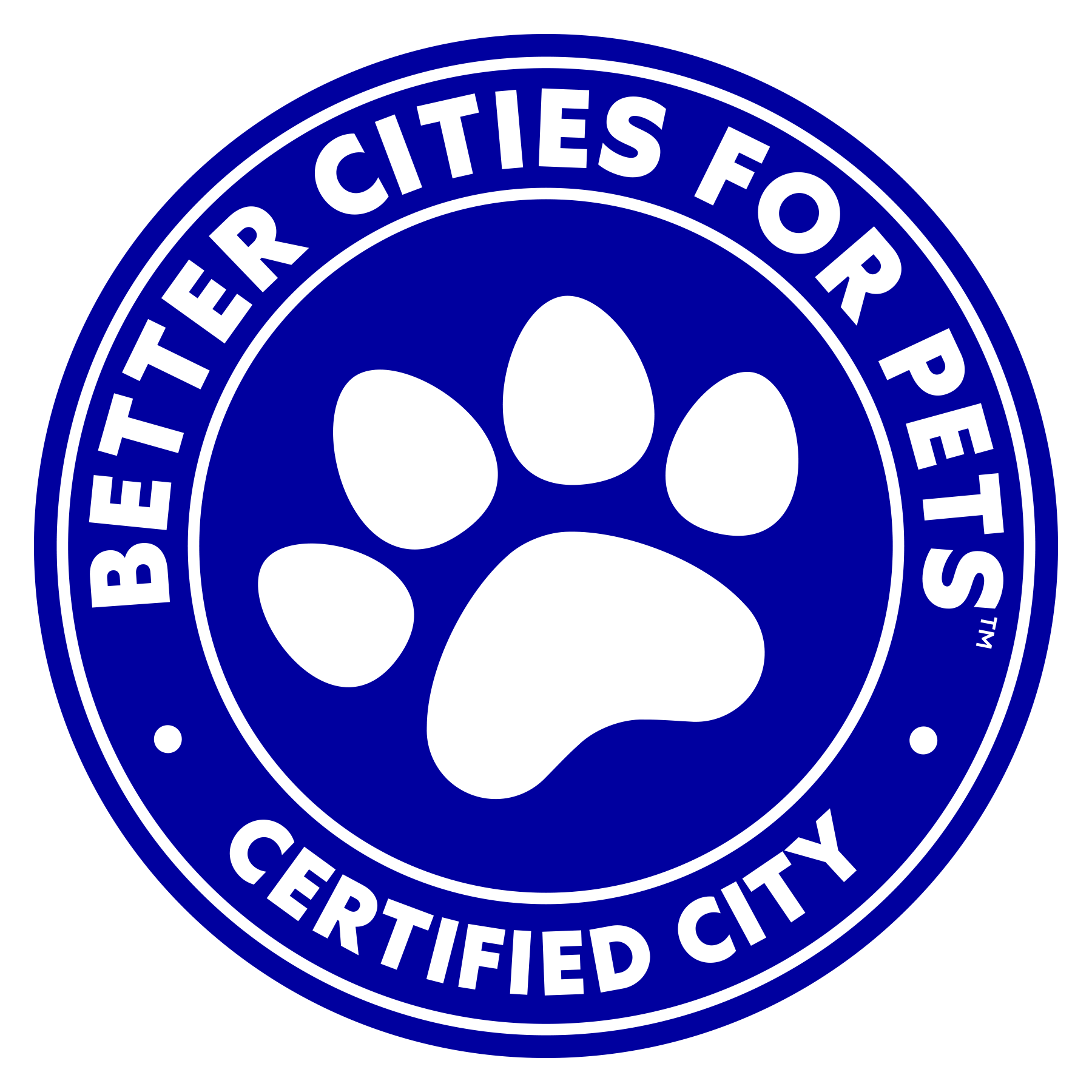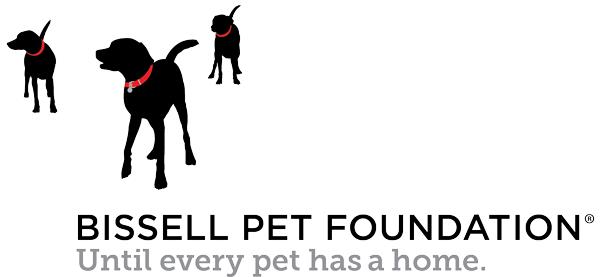


Dear Neighborhood Associations,
Addressing livability issues between people and animals within city neighborhoods is a priority for our department. We are here to assist neighborhoods by enforcing leash laws for cats and dogs, rabies vaccinations, pet registrations, nuisance animal complaints such as sanitation and barking, conducting bite investigations, and by picking up stray animals.
Pet ownership among U.S. households is reported to be at 62%, with dogs and cats found in at least one out of three homes. Our department celebrates the relationship between people and animals with a conscientious aim towards public health and safety.
We dedicate this part of our website specifically for neighborhood associations looking for quick, simple, and accurate information to copy and publish as written in association newsletters. We will make changes relevant to the seasons and weather, and post information when animal health issues are present in our community. If you have topics you wish to see added, please e-mail This email address is being protected from spambots. You need JavaScript enabled to view it.
ARTICLES
Is Your Dog Behaving Badly?
Experts have some answers for dogs that bark and charge at others.
According to expert trainer Sue Sternberg of Accord, N.Y., "Dogs need supervision, guidance, leadership, training and a repertoire of 'tricks' or behaviors you can ask them to do when they're making a bad decision."
In the case of a dog that charges a fence, the dog is practicing aggression towards people or other dogs. It often starts with barking and aggressive displays — lunging, growling, showing teeth, snapping — and progresses over time ... into something far worse. The dog is essentially practicing to behave aggressively towards others ... and we aren't yet good at predicting which dogs will practice their way into aggression, and which will remain at the level they're at. Particularly if a dog is still young, the owner must manage the dog's environment so it cannot practice this behavior a second longer, which means the end of letting the dog outside in the yard unsupervised. The owner should go with the dog or keep the dog on a leash until trained to come and do something other than lunge and bark. Every dog is capable of aggression. ... What starts out as barking at people or dogs can easily morph into actual aggression.
Aggression is often very specific, and even the most dangerous dog will be fine and even gentle 95% of the time. Dogs that bite are usually not savage beasts, but average-seeming pet dogs that are fine most of the time until they encounter the person, dog or set of circumstances that sets them off. If the dog is actively seeking out neighbors and passerby, and already barking, growling and charging the fence, the dog needs intervention now before the dog starts actually biting. It is much easier to intervene early in a behavior problem than to wait to see how bad it gets, and then try to erase actual aggression.
In the city of Fort Wayne, nuisance barking may be reported by calling Animal Care & Control at 427-1244. By ordinance, nuisance barking is when a dog barks, yelps, whines or howls in excess, continuously for 15 minutes or for a total of 20 minutes in a one hour period.
Regardless of why an owner feels their dog is motivated to bark, growl, or charge a fence or passerby, the owner is ultimately responsibility for supervising their dog. The owner must seek training for their animal to develop better behaviors that they can ask the dog to do. And, never leave the dog alone outside when they are not at home.
Avoid Fines and Court
Sometimes, something as innocent as a cuddly, lovable dog or cat can land people in court.
It happens when pet owners overlook the requirements and responsibilities that come with owning man's best friend. On the surface, it might look as if someone is in court for not purchasing a yearly city pet registration tag. Failure to spay or neuter a dog or cat that was picked up for repeatedly running through the neighborhood can also be a ticket to court.
Officials with Fort Wayne Animal Care & Control say that most court appearances can be easily avoided by taking care of what is required within 30 days of the issued ticket. The ticket will then be void and no fines will be imposed.
So how then do people end up in court over pet registration tags or other violations of city law? According to shelter officials it happens because of three scenarios:
- The pet owner ignores the ticket.
- The pet owner gives away the animal and thinks the ticket goes away.
- The pet owner fails to call Animal Care & Control before the date specified on the ticket.
It's not uncommon for someone to forget to get the yearly vaccinations and pet registration tag required for all city dogs and cats. It can happen to any pet owner. The ticket issued by an animal control officer is a reminder. It's called a void of compliance ticket because once the pet owner takes care of the circumstances of the ticket and notifies the shelter, the ticket is void and fines go away.
Ignore the ticket or fail to notify Animal Care & Control and the pet owner will be called into court. Ignore the court date and a warrant will be issued by the court for the pet owner's arrest.
It's certainly easier to make a plan and make a call to avoid court.
Without a doubt, pet ownership can be a joy, but it comes with work and responsibility. Cleaning up after them, daily walks, scooping the litterbox, grooming, the cost of yearly vaccinations, spay or neuter surgery, an obedience class, preventative medicines, a registration tag and a microchip come at a price. Pets simply need us to be reliable and in return their unconditional love and companionship makes it worth the cost and the effort.
Does Your Dog Escape?
If your dog is running loose, he's in danger. He could be hit by a car, injured in a fight with another dog, or hurt in any number of other ways.You're also liable for any damage or injury your dog may cause, and you may be required to pay a fine for not following the local leash law. To prevent escapes, you'll need to learn how and why your dog is so determined to get out.
It’s quite possible that your dog is bored from being left alone for long periods of time and islooking for people to interact with. Give your dog something else to do. Take him on a dailywalk so he’ll have good mental and physical exercise. Another cause for running off happens when a dog hasn’t been spayed or neutered. An unaltered
dog is driven to breed, which often results in unwanted puppies. Be sure your dog is spayed or neutered to prevent roaming behaviors. Some dogs escape the yard from fear of loud noises. These are dogs that should never be left alone outside during thunderstorms and times when construction work or even fireworks are i
your area.
For additional tips to keep your dog safely confined and to learn how to repair fences that dogs climb or dig under, visit the Fort Wayne Animal Care & Control website at www.fwacc.org. Keep your dog safe and avoid complaints from neighbors that may lead to fines for allowing your dog to run at large.
Chaining Dogs Outside
Dog owners who routinely chain their dogs outside will need to observe a new city law that limits how and when dogs can be tethered. As of January 2008, dogs are no longer allowed to be tethered between the hours of 11 p.m. and 6 a.m. During these hours dogs can be inside a fenced yard, kennel, or garage with a proper dog house.
- No dog under the age of six months and no dog that hasn't been spayed or neutered can be tethered at any time, day or night.
- Spayed and neutered dogs can be tethered between 6 a.m. and 11 p.m., but no more than three may be tethered at the same time on one property.
- Multiple altered dogs may not have contact while they are tethered. The required six foot lead may not reach within three feet of another property, public thoroughfare, or right of way.
The law also prohibits tethering a dog at a home where Animal Control has had to untangle dog tethers more than two times in a year. The new tethering law is a major accomplishment for the welfare of dogs in Fort Wayne and towards the safety and livability of citizens.
Free Straw for Dog Houses
Residents of the City of Fort Wayne in need of straw bedding for a dog's house can call our office at 427-1244 and choose option one to speak to a clerk in our office. You can also come in person to the shelter during normal business hours to receive a voucher that you can redeem for straw bedding from a local designated supplier.
Fines Imposed for Dog and Cat Leash Law Violations
Pet owners will want to take extra caution to keep their dogs and cats properly confined to their property or leashed when going for walks off property to avoid hefty fines and a possible court appearance. According to Fort Wayne Animal Care & Control officials, fines of $50 - $2,500 per offense per day can be imposed for violations to the City Animal Care Ordinance. All dogs and all cats must be under the physical control of the owner or attendant by leash when off the owner's property. This includes walking a dog through any city park or letting your dog outside to stretch his legs and do his business. If your yard is not fenced, you’ll need a good leash. Keep in mind that your pet must be under your control and not be a nuisance or threat to other people or animals passing by, so avoid using a leash that is long enough to reach public sidewalks.
Animal Care & Control recommends citizens call to report owner’s who repeatedly allow their pet to leave their yard and roam freely. Be prepared to give the exact street address of where the animal lives and plan to call every time the violation occurs. Snapping a photo of the animal roaming freely is also helpful. Cat traps are available for loan to city residents to help with free roaming cat problems. Call 427-1244 and choose menu option 7 to speak to a clerk.
Pet owners should never assume that neighbors enjoy visits by your pet. Be a good pet owning neighbor and keep cats and dogs confined safely at home, use a leash when taking your pet for a walk, and always clean up after your pet. If your pet should disappear from home, begin your search at Animal Care & Control located at 3020 Hillegas Road. Your pet may have been found and taken to the shelter for safe keeping and reclaim. For more information visit the shelter website at www.fwacc.org.
Pet Limits Within the City of Fort Wayne
City ordinance limits the numbers of dogs and cats that may reside at a residential city property. At no time shall the number of dogs exceed five, number of cats exceed seven, or the total number of dogs and cats exceed seven at one property. You may decide to keep one dog or cat over the age of five months unaltered. All others must be spayed or neutered. Please make sure the dogs and cats you own are vaccinated yearly and seen by a veterinarian for the health and safety of pets and people. Report nuisance animal problems to Animal Care & Control 260-427-1244.
Financial Aid Available - Spay Neuter Assistance Program
The City of Fort Wayne offers financial aid to Fort Wayne pet owners with verification of financil need to spay or neuter dogs and cats through a program called SNAP (Spay Neuter Assistance Program). To qualify, your pet must have a current rabies vaccination and there is a small required co-pay. A pet that has been spayed or neutered is less likely to become a biting dog, less likely to roam, won't mark territory with urine, and will be a healthier animal. For more information on guidelines call Animal Care & Control at 260-427-1244.
Nuisance Barking
A common neighborhood animal control complaint centers on dogs that bark excessively. Continuous barking, especially during late night hours, can result in neighborhood disputes and is a violation of the City Animal Care Ordinance. According to code, “Noisy Dog” - no person shall allow an animal to bark, yelp, whine, howl, or make sounds common to its species in excess, continuously for 15 minutes or for a total of 20 minutes in a one-hour period.
Although it is normal and reasonable for dogs to bark from time to time, just as children make noise when they play outside, continual barking is a symptom of a problem that needs addressing. Most often dogs howl, bark and whine out of frustration and boredom. Increase the dog's exercise through daily walks and play time to give the dog more “people time” and mental stimulation from new sites and smells. Neutering is recommended to reduce territorial barking and crate training is strongly recommended to bring the dog inside the house while you are away. Be a considerate neighbor and a responsible dog owner and eliminate the neighborhood complaints from the mail carriers, neighbors, and parents of children walking to and from school. Report nuisance barking to the Animal Care & Control office at 427-1244. In some cases an affidavit process may be offered, which will result in the dog owner being summoned to Court.
Cat Traps Available to Help Stray Cats
Animal Care & Control has live cat traps available for any city resident who may want to remove one or more stray cats from an area. With current cold temperatures and wind chills, stray animals are more likely to experience painful frostbite and hypothermia. Removing them humanely from the streets with a live trap not only prevents suffering, but can also reduce the spread of disease and animal waste. To obtain a live trap, call 260-427-1244 (option one on the menu) to speak with a clerk. Stray cats breed continually from spring until fall, which creates additional stray cats that pray on song birds, and cause disturbances for neighbors.
If you are feeding free-roaming cats and are interested in learning more about how you can get them 3-year rabies vaccinated and spayed or neutered - learn more about our Community Cat Program here!
Did Your Dog Leave Something Behind?
Animal waste left in public areas and in neighborhood yards is a familiar complaint. And, while your neighbors might enjoy seeing your dog, they do not enjoy seeing what he leaves behind. Here is a reminder from the city of Fort Wayne. Sanitation law requires citizens to remove animal feces immediately from public lands and from the property of another. Citizens must also maintain animal areas in a sanitary manner regularly and as often as necessary to prevent odor, or health and sanitation problems. When sharing common areas, be considerate of where you take your dog to urinate. Although it is not a legal requirement to remove animal urine, allowing a dog to eliminate in public areas where children play is inconsiderate and just bad form. When walking your dog, do not allow it to stop and sniff someone else's property when you know your dog is looking for a spot to go. If you encounter an on-going problem concerning sanitation, report the concern to Animal Care & Control at 260-427-1244. If at all possible, a timely photograph of an owner allowing their dog to leave feces behind in your yard has been known to result in a timely $50 citation.
Solving “Cat”-astrophes!
Last year over 6,000 cats were brought to Fort Wayne Animal Care & Control, most of which were roaming freely through neighborhoods. City laws regarding confinement, vaccination, spay/neuter, and pet registration apply to both cats and dogs. Cats are required to have a current one year or three year rabies vaccination, they must be confined inside the home or on the property of the owner, and they must wear a current registration tag from Animal Care & Control. Only one cat or dog per household can be unaltered without a cattery or kennel permit. To report a stray animal, call 260-427-1244. Humane live traps are also available from the shelter. To claim a lost pet, visit the shelter at 3020 Hillegas Road.
Kittens Having Kittens
It's a fact, kittens as young as six months old can begin reproducing if the owner delays the spay or neuter surgery. Shelters accross the country including Fort Wayne Animal Care & Control are crowded by unplanned litters of kittens given up by owners every spring. If your pet is pregnant, you must obtain a breeder permit from Animal Care & Control regardless of whether the litter is intentional or unintentional. The permit is required before you can sell or give away the kittens or puppies. Call a local veterinary clinic to schedule this low-risk surgery or call The HOPE for Animals Spay Neuter Clinic (260-420-7729), or the Low Cost Spay Neuter Clinic at 1313 Broadway (424-5982).





